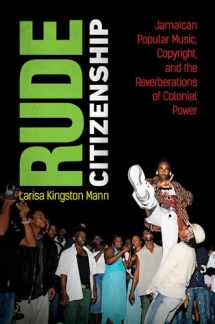
Rude Citizenship: Jamaican Popular Music, Copyright, and the Reverberations of Colonial Power
Book details
Summary
Description
In this deep dive into the Jamaican music world filled with the voices of creators, producers, and consumers, Larisa Kingston Mann—DJ, media law expert, and ethnographer—identifies how a culture of collaboration lies at the heart of Jamaican creative practices and legal personhood. In street dances, recording sessions, and global genres such as the riddim, notions of originality include reliance on shared knowledge and authorship as an interactive practice. In this context, musicians, music producers, and audiences are often resistant to conventional copyright practices. And this resistance, Mann shows, goes beyond cultural concerns.
Because many working-class and poor people are cut off from the full benefits of citizenship on the basis of race, class, and geography, Jamaican music spaces are an important site of social commentary and political action in the face of the state's limited reach and neglect of social services and infrastructure. Music makers organize performance and commerce in ways that defy, though not without danger, state ordinances and intellectual property law and provide poor Jamaicans avenues for self-expression and self-definition that are closed off to them in the wider society. In a world shaped by coloniality, how creators relate to copyright reveals how people will play outside, within, and through the limits of their marginalization.


We would LOVE it if you could help us and other readers by reviewing the book
Book review



